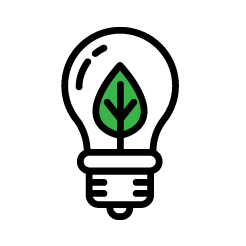There are two main used type of initiatives where citizens come together to tackle common energy issues: Energy Communities, which can be further divided into Citizens Energy Communities or Renewable Energy Communities, and Energy Cooperatives.
Energy Communities
Energy communities is an emerging concept for which no widely accepted definition exists and which is applied in various ways, such as:

a possible type of organising collective citizen actions in the energy system

entities that can exercise energy-related activities, e.g., generation, distribution, supply, aggregation, consumption, sharing, storage of energy, provision of energy-related services..

non-commercial type of market actors that combine non-commercial economic aims with environmental and social community objectives

collective switching campaigns, collective investments in solar panels, the ownership of an energy supply company, or even a distribution network.
There are two new official EU level definitions for energy communities, namely: ‘Citizen Energy Community’ and ‘Renewable Energy Community’.

Citizen Energy Community (CEC)
“New market actors, new types of membership structure, governance requirements and purpose” (Defined in: Internal Electricity Market Directive (EU) 2019/944 [June 2019])
- Governance: open and voluntary
- Ownership and control: citizens, local authorities and small businesses
- Purpose: social, economic and environmental benefits rather than financial profits
- Geographical scope: not necessarily the same geographical location
- Technology: neutral (both renewable and fossil-fuel based)
- Activities: generation, distribution, supply, consumption, sharing, aggregation and storage of electricity, and also energy-efficiency, EV charging and other energy-related commercial services
- Participants: anyone (natural persons, local authorities and micro, small medium and large enterprises...)
- Autonomy: not defined, but decision-making should be limited to those members or shareholders that are not engaged in large-scale commercial activity and for which the energy sector does not constitute a primary area or economic activity
- Effective control: natural persons, local authorities and micro and small enterprises

Renewable Energy Community (REC)
“A way to expand renewable energy” (Defined in: Renewable Energy Directive (EU) 2018/2001 [December 2018])
- Governance: open and voluntary
- Ownership and control: citizens, local authorities and small businesses
- Purpose: social, economic and environmental benefits rather than financial profits
- Geographical scope: local communities organised in the proximity of RE projects
- Technology: all forms of renewable energy in the electricity and heat sectors
- Activities: generation, distribution, consumption, storage, sale, aggregation, supply and sharing of renewable energy, and also energy-related commercial services
- Participants: natural persons, local authorities and micro, small and medium enterprises (and must be accessible to consumers in low-income or vulnerable households)
- Autonomy: should be capable of remaining autonomous from individual members and other traditional market actors that participate in the community as members or shareholders
- Effective control: natural persons, local authorities and micro, small, and medium-sized enterprises
Energy Cooperatives
Community energy initiatives can also take diverse legal forms (limited liability companies, trusts, associations, partnerships, foundations, non-profit organisations...), with the most common type being renewables cooperatives.

Energy Cooperative
A type of social and economic enterprise, a legal form that enables citizens to collectively own and manage renewable energy projects, where:
- the base is democratic governance (one member - one vote)
- local residents or from the neighbouring area can invest in renewable generation by buying shares to finance a project.
- citizens can consume and share renewable energy.
- the distribution of profits is limited and surpluses are reinvested to support its members and/or the community.
- the allocation of revenues from the projects is regulated by the statutes of the cooperative, which relate to its main purpose.
- usually the principles are the following (outlined by the International Cooperative Alliance):
- Voluntary and open membership
- Democratic member control
- Member economic participation
- Autonomy and independence
- Education, training and information
- Cooperation among cooperatives
- Concern for community
Potential Services
Collecting micro-donations on energy bills
Some cooperatives offer the possibility for energy consumers to make micro-donations based on their energy bills. For example in France, the renewable energy cooperative Enercoop allows its clients to donate 0,01€ for each kWh consumed to the benefit of Energie Solidaire fund which then reallocates the collected money to fuel poverty mitigation programmes.
Energy surplus donations
The development of renewable energies, and especially solar energy, offers new perspectives in collecting resources to support local fuel poverty organisations nationwide.Public authorities installing solar panels on publicly owned buildings could reallocate the surplus production to supply households in energy poverty situation.
Energy Advisors
The renewable energy cooperative ZEZ assists and provides training for unemployed young people to transform them into energy advisors. Thanks to this programme, the trained youth can support low-income households in the local community and are employed by local governments
Cooperative’s investment
Coopérnico, a Portuguese renewable energy cooperative, allows its members to invest in solar photovoltaic projects developed in collaboration with social entities such as charities, education institutes or other cooperatives. Thanks to these initiatives, social entities can install renewable self-consumption systems on their rooftops and benefits significant reduction on their electricity bills. On the other hand, members receive interest rates between 2.5% to 3% for their investments.
Support projects implementation
Just a Change is a Portuguese non-profit association that collaborates with social networks to identify households in poverty situation and take care of collecting the main resources needed for the project's implementations. From 2010, the association has successfully refurbished hundreds of houses and institutions thanks to the support of thousands of volunteers coming from several countries. After the renovation works, Just a Change monitor the rehabilitated buildings to properly quantify the impacts of its interventions and to ensure that every family is further supported by social workers.